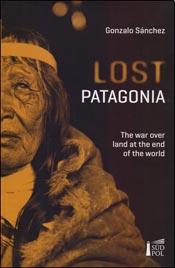By Gonzalo Sanchez, 2011. Translated by John Fowler
I picked this book up during my first week in Buenos Aires from La Libreria de Avila for several reasons. It first stuck out to me because as a translated work it was one of the only English titles I could find, but also because I am deeply and irrationally interested in indigenous culture and legislation. After spending time with the Quechua community in Ecuador this past summer, it seemed like the perfect read to familiarize myself with the stories and struggles of the people who inhabit the Patagonia region of Argentina, one my most anticipated trips I have planned in the upcoming months and one of the reasons I chose to study in this beautiful country.
Lost Patagonia is a journalistic work by the Argentine writer Gonzalo Sanchez, and it chronicles the complicated struggle for land rights in the continents most mysterious and humbling area of territory. Everybody seems to want a stake in it–big timber and natural resource businesses, governmental organizations, celebrities, environmentalists, and of course, those who have inhabited it for hundreds of years. Sanchez pays visits to countless communities, families, and individuals involved in this struggle for land rights and details the harsh reality of the current condition prohibiting groups such as the Mapuche and Tehuelche people, who have experienced extreme marginalization, been the target of historic and present day discrimination, and even been murdered in order for landowners to forge their signatures on flimsy and inauthentic contracts signing away their homelands.
The accounts of individuals detailed in this book are fascinating and provide a lot of insight into the political and social dynamic in the various regions of Patagonia, and although it has not turned me off from visiting the region, it has made me more conscious of the companies I will purchase from in the future as well as the way that I will travel. Most importantly, Lost Patagonia illustrates the underlying fact that the beautiful landscapes and resources that the Patagonia region has to offer are extremely coveted and some are either in serious danger or under attack. However, there are individuals working towards a diplomatic solution. Right now conditions are bleak, but forever hopeful.

